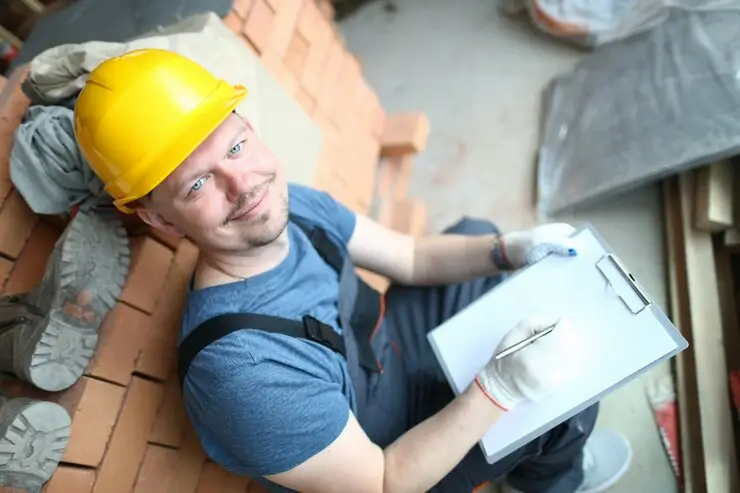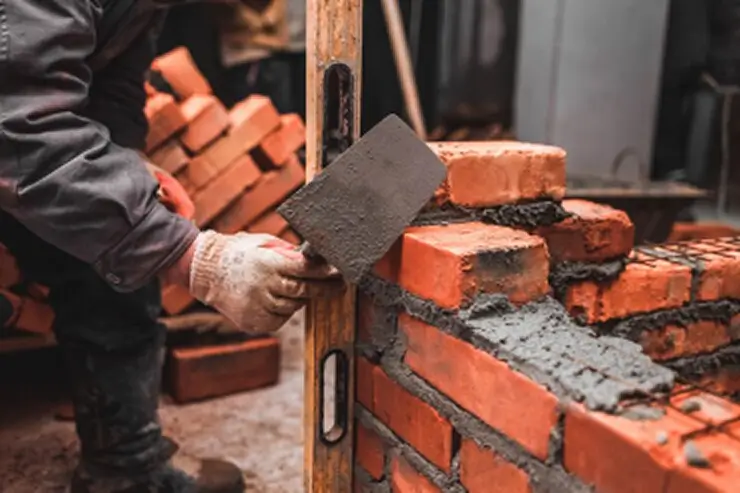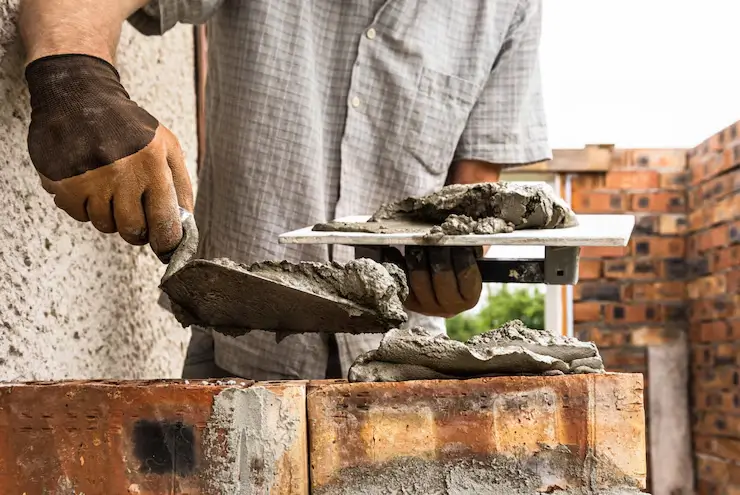Do you know how important masonry is to a building’s solid foundation? If not, we will tell you when masonry components are aligned correctly, the structure appears secure and sustainable. It is also a good and reasonably priced way to increase the heating and cooling efficiency of a building.
Estimating the total cost of repairs is easier when you know the hourly rate. Masonry work is and always will be a crucial component of any home repair or construction project, as everyone working in the industry knows. Let’s explore how much it costs hourly.
Details of Daily Masonry Work and Prices
Three primary categories of masonry work exist. Let’s go over the labor skills and overall cost needed for each project.
Repointing and Tuckpointing
Bricks are held together by mortar, and over time, that mortar starts to break or fall out. Rain, snow, and changes in weather make it worse. When this happens, it needs to be replaced to keep the wall strong. Repointing is when the old mortar is taken out and replaced with new mortar. Tuckpointing is similar, but it also uses two colors to make the bricks look better. It’s more for looks and takes more skill. That’s why tuckpointing usually costs a bit more. You might pay around $50 to $75 per hour for this kind of work. If the job is priced by area, it can be about $13 to $25 per square foot.
Foundations Repairs
Repairing the damaged brick and stone foundation is known as foundation repair. Rebuilding an entire section is sometimes required to prevent collapses and damage, while other times, only a smaller area needs to be renovated. The area that requires replacement and renovation determines how much this masonry work will cost. The typical crack rate ranges from $250 to $800 per crack. The hourly wage for this masonry work is between $70-$120.
Brick Porch or Wall Repairs
Sometimes, bricks on your porch or wall start to crack or fall out. It could be a small fix, or a few bricks need replacing. This kind of work isn’t just for homes — it happens in shops or bigger buildings too. If it’s just a crack, it’s usually cheaper. But if work involves removing and then replacing bricks, it will cost more. Mostly, brickwork costs from $10 to $30 per square foot. And if you are concerned about the labor, it can cost between $65 and $100. It all depends on how bad the damage is and how much needs fixing.
Average Prices for Masonry Work
Never ignore the rates of a mason when working on a masonry project. Also, factor in the cost of materials, overheads, and contingencies to keep the project on track.
These are the typical costs for various kinds of masonry work.
Also Read : How Much Will a Concrete Slab Cost in 2025: Prices and Insights
1. Masons’ Hourly Rates
An accurate price for a basic masonry task requiring a mason’s skill should take site, task difficulty, and competency into account.
Average Hourly Rate
An average mason’s work payment ranges from $45 to $75 per hour, depending on a number of certain local and personal factors.
Expert Masons or Unique Projects
Expert masons are notoriously challenging to work with. Be ready to spend $100 or more if you require highly qualified employees with specific skills and experience. Designing or building restorations is an example.
Masons with less experience
If a novice or less experienced mason is performing simple jobs or is still attempting to gain experience, he would charge $30 or such.
2. Masonry Job Costs
Beyond the hourly rates, it is helpful to know the exact estimated expenses of different masonry projects. These undertakings range from minor fixes to major building endeavors.
Type of Masonry Work |
Cost Range Per Hour |
Cost Estimate Per Day |
| Bricklaying | $30 – $60 per hour | $300 – $800 per day |
| Chimney Repair/Restoration | $40 – $75 per hour | $400 – $3,000+ |
| Patio Installation | $45 – $85 per hour | $2,500 – $10,000+ |
How Can Masonry Work Be Calculated?
- Brick masonry volume is equal to wall thickness times depth (m) times length (m).
- Brick Length x Brick Width x Brick Height = Brick Size.
- Volume of Brick Masonry/Volume of One Brick = Number of Bricks
- The volume of bricks multiplied by the volume of bricks without mortar is the real volume of brick mortar.
- Mortar Quantity = Brick Masonry Volume – Bricks Without Mortar Volume
| Parameters | Value |
|---|---|
| Volume of a Brick (Cement + Sand) | 0.002 m3 |
| Ratio (Sand: Cement) | 5:1 |
| Volume of a Brick (Only Sand and Cement) | 0.002 m3 |
| Total Parts (Cement + Sand) | 6 |
| Volume conversion (m3 to kg) | 1500 kg/m3 |
| 1 cubic meter | 35.3147 ft3 |
| Length and width measurement units | Centimeters (cm) or meters (m) |
| Capacity of one cement bag | 0.035 m3 |
How Much Does Masonry Repair Cost?
The tables below show the average masonry repair cost:
1. Masonry Repair Costs
| National average cost | $1,981 |
| Low-end average cost | $1,077 |
| High-end average cost | $3,641 |
2. Masonry Repairs By Project Scope
| Work needed | National average cost range |
|---|---|
| Minor repairs | $851-$2,877 |
| Major structural work | $1,476-$4,991 |
| Complete rebuild | $1,500-$5,073 |
3. Costs By Type Of Repair
| Repairs needed | National average cost range |
|---|---|
| Fixing cracks in mortar | $963-$3,256 |
| Fixing a water leak | $1,229-$4,156 |
| Fixing cracked foundations | $1,198-$4,053 |
| Fixing a leaning structure | $1,210-$4,090 |
| Fixing cracks on bricks or stone | $982-$3,320 |
Factors Affecting Masonry Work Cost per Hour
Even if there is an hourly rate and a total project cost, a greater knowledge of the cost of masonry work can be obtained by also considering the project type, geographic area, and material selections
Geographical Location
Generally speaking, masonry labor costs vary depending on the locale. For example, in the more expensive cities, labor rates tend to be higher. However, rates are typically lower in rural areas with reduced living expenses. These elements provide more evidence that the cost of masonry projects should always be included in the budget.
Complexity of the Project
Because masonry work is so intricate, the cost may also vary. It is less expensive to do simple jobs like building a brick wall than more intricate and specialized ones like building a custom stone fireplace or fixing an old stone building. A specific level of expertise, enough time, and costly materials are needed for more intricate or highly specialized sorts of work.
Additionally, these raise the cost of the work by a large amount. Furthermore, complex designs necessitate more thorough planning and further discussions with consultants, architects, or even designers. It adds costs to the already high cost of project management or design work.
Type of Project
The type of materials used and the amount of labor involved determine the cost of many projects. Consider the distinction, for instance:
- Bricklaying tends to be less expensive than marble or granite.
- Concrete projects often have cheaper prices, albeit they can vary greatly in size. For example, large concrete structures and mass foundations typically require more labor and materials.
Because of the technology and materials required, deeper concrete pours and foundations for commercial structures, in particular, result in significantly higher expenditures.
Knowledge and Proficiency
A masonry contractor’s fees will increase with their level of expertise. If you want to construct a new custom construction or restore an existing one, you will need a highly skilled professional, and you should be prepared to pay their fees. But be ready to shell out top bucks. Great intricacy and ability are needed for unique projects that need delicate detail, such as stonework or even saving a landmark structure, and these jobs are typically more expensive.
Materials and Permits
Permits for large masonry projects cost anywhere from $100 to $250. Furthermore, depending on the location, material transportation costs for things like bricks range from $60 to $200.
Brick wall waterproofing is one of the extra services that costs $2 to $10 per square foot. The price range for mortar color matching testing is $150 to $325. Specialized procedures may be required for complex or historical projects, increasing the cost of personnel and materials.
Additional Costs to Consider
Labor usually costs the most in any masonry job. But it’s not the only thing to budget for. There are a few other expenses that can show up as the project moves along.
Permits
If the job changes anything major, like part of your house or a wall, you’ll probably need a permit. That can run between $50 and $500, depending on what it is.
Materials
On top of labor, you’ll be paying for bricks, mortar, stone, and other stuff. It could be $500 or even a few grand, depending on what you use.
Disposing of Materials
If something needs to be torn down first, there’ll be waste to deal with. You might need to pay around $50 to $200 to have the old materials and debris hauled away properly.
Masonry work is generally very expensive to do. Effective techniques, however, can significantly lower expenses without sacrificing quality. There are chances to make sensible choices that result in positive consequences when planning is involved. The following ideas could lower the total cost of the masonry work that is done:
Create Maintenance Schedules
Using preventative maintenance to address possible issues is one way to manage costs. For instance, rebuilding and renewing old mortar through repointing reduces the likelihood of future moisture infiltration issues and costly structural damage repair. Larger issues can be significantly avoided by taking care of lesser ones. The masonry may be kept in good condition for a long time with a regular walk-through maintenance plan and recurring inspections.
Make Use of Local Services
Local service providers could be more cost-effective than hiring masons from far away. Most local contractors charge less than non-local ones because they don’t have to travel. They can also purchase goods from nearby vendors, which lowers delivery expenses.
Better project completion is also made possible by local service providers’ greater knowledge and comprehension of local weather patterns and building codes. Because of this, using local service providers benefits the economy in addition to the area’s reputation.
Think About Additional Materials
The most popular materials for masonry are natural stones, marble, and even premium-grade bricks, but they are also the priciest. Because concrete blocks and engineered stones are less expensive, those on a restricted budget might want to use them.
These materials are simple to install and maintain while still offering a strong and attractive finish, they may be used for a lower cost.
Put in Some Work on Your Own
For simpler projects, you can save money by doing some of the work yourself without assistance.
However, other tasks, such as masonry, require specialized labor because it is essential to have an experienced mason perform the actual installation. You can reduce project expenses while ensuring that the work is done appropriately by carrying out simple preliminary chores.
Easy Design
Among the sophisticated masonry designs that are labor-intensive and demand more materials, which raises the cost, are elaborate brick patterns and custom stonework. Simplifying those designs could result in lower building costs.
A classic, uncomplicated design can be just as beautiful and useful as one that is intricate. Because simpler patterns allow for the reduction of time and effort during the project’s execution phase, the project’s overall labor expenses will be lower.
What to Know About Mason vs. Handyman Rates
If you’re hiring someone for masonry work, you should know these few things mentioned below:
Skilled Masons
Good masons usually charge between $50 and $100 an hour. They work faster and do a cleaner job. If you need detailed work, like stone designs or fixing old brickwork, they’re worth the money. They get it done right the first time.
Handymen or Less Skilled Workers
Handymen often charge $30 to $50 an hour. They can do small or easy jobs, but they might take longer, and the work may not be as sharp.
For bigger or more important projects, hiring a skilled mason is usually the smarter choice. You pay more, but you save time and avoid problems later.
Conclusion
Masonrycons are essential in house repair and building because of its elegance and ability to create custom designs, like stonework. Because masonry construction requires patience and accuracy, labor and material costs are a significant factor in pricing rises.
By including the location, the extent of the task, its difficulty, and the necessary materials, a more accurate masonry estimate can be generated. Whether the task at hand is fixing the chimney crown, building a brick wall, or restoring a stone patio, budgeting and choosing the correct mason will allow the appropriate completion of projects in a timely manner.
Planning and budgeting are made easier when one is aware of the cost parameters of masonry construction, which results in the highest level of pleasure.
FAQs
How do I know if my brickwork needs fixing?
You’ll see cracks in the bricks or the stuff between them. If the bricks are peeling or bits are falling off, that’s a clear sign. Water gets in, freezes, and causes pieces to break off.
How much does a mason charge?
Most charge between $40 and $100 an hour. It depends on where you live and how skilled they are. More experience usually means a higher rate.
How is brickwork priced?
Some go by the square foot, others by the brick. Square foot jobs can cost $10 to $30. Per brick, it’s usually $1 to $5, labor included.
How is brickwork priced?
Clay bricks and concrete blocks are the most common. Others, like cast stone or calcium bricks, are used for special projects.







